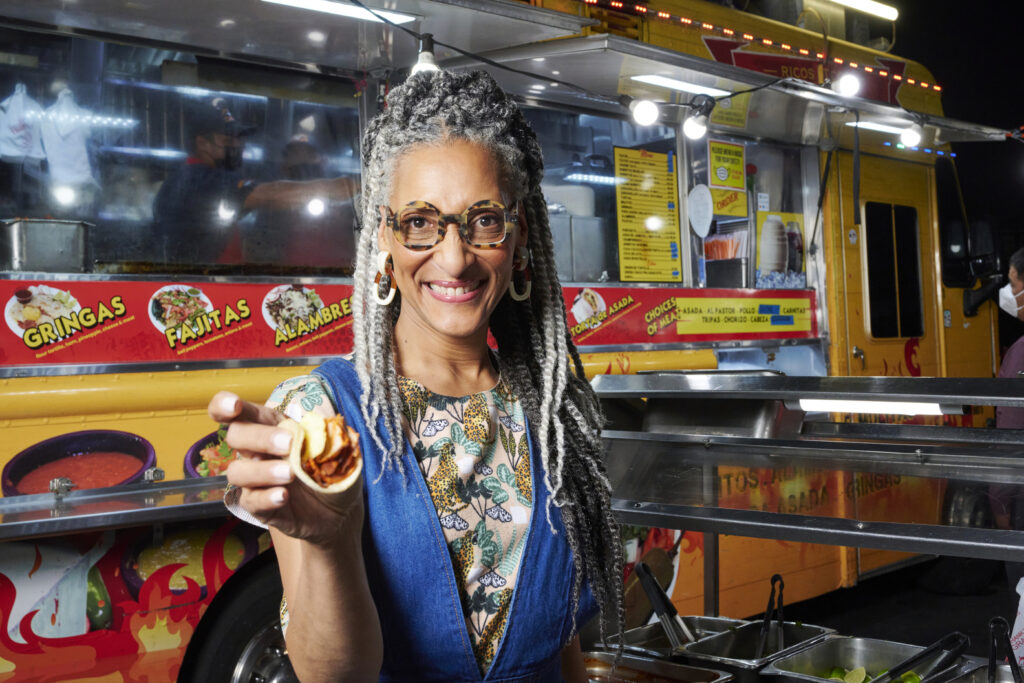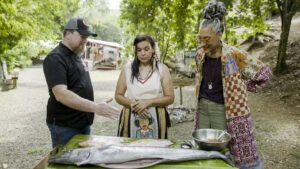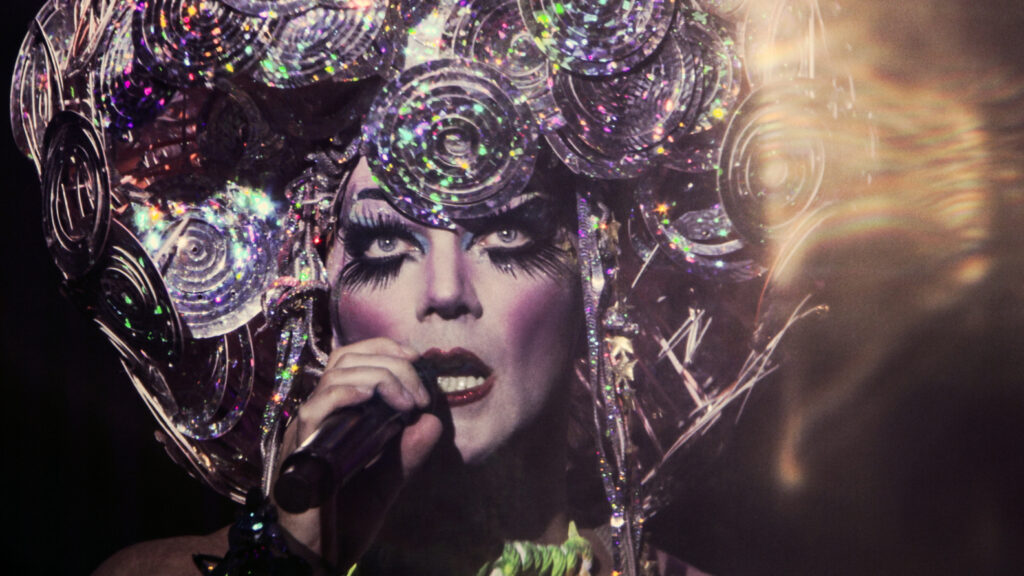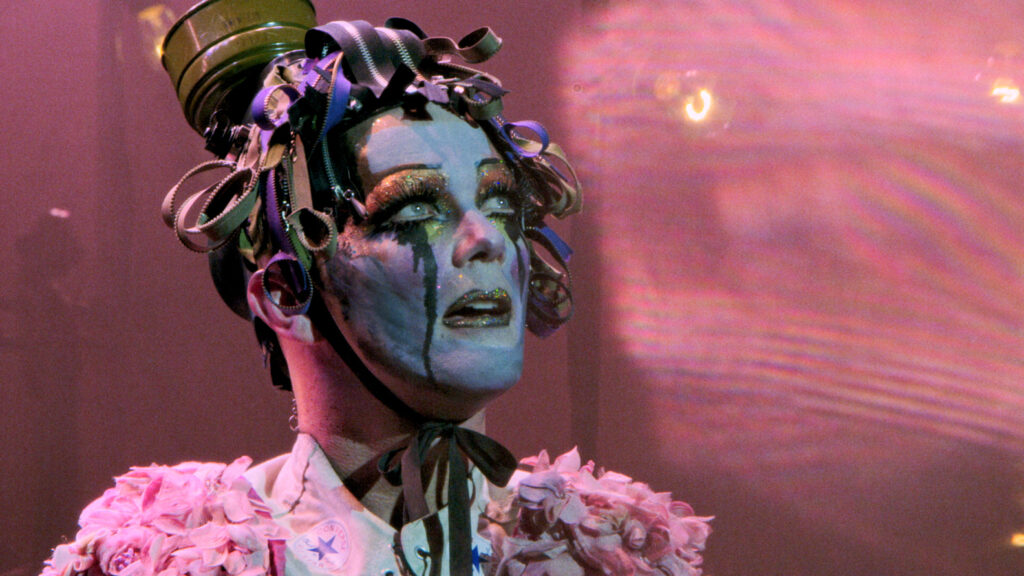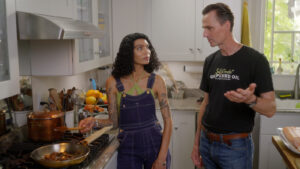June 23, 2024
by Carla Hay

“Taylor Swift vs. Scooter Braun: Bad Blood”
Directed by Kate Siney
Culture Representation: The two-part documentary “Taylor Swift vs. Scooter Braun: Bad Blood” features a predominantly white group of people (with a few black people and Asians) discussing the feud that erupted in 2019 between superstar Taylor Swift and entertainment mogul Scooter Braun, after Braun bought the master recordings for Swift’s albums that she originally recorded for Big Machine Records.
Culture Clash: Swift accused Braun of being a business bully, while Braun said the business deal was legal and accused Swift of ordering her fans to harass him and his loved ones.
Culture Audience: “Taylor Swift vs. Scooter Braun: Bad Blood” will appeal primarily to people who are fans of Swift or Braun and are interested in documentaries that give basic lessons on media manipulation and how the music industry works.
“Taylor Swift vs. Scooter Braun: Bad Blood” doesn’t have any new or bombshell information but it’s an adequate look back at one of the biggest battles in Taylor Swift’s long history of battles against real or perceived enemies. It’s a documentary that does exactly what is expected when looking at both sides of this feud, without interviewing the people at the center of the feud. There’s competent explanation of business deals, but better film editing was needed for some footage.
Directed by Kate Siney, “Taylor Swift vs. Scooter Braun: Bad Blood” is divided into two episodes. The first episode is titled “Taylor’s Side.” The second episode is titled “Scooter’s Side.” There’s the usual mix of interviews done exclusively for the documentary and archival clips from other sources. The interviewees featured in “Taylor’s Side” are journalists, entertainment attorneys and Swift fans. The interviewees featured in “Taylor’s Side” are only journalists and entertainment attorneys. Apparently, the documentary’s filmmakers couldn’t get interviews with anyone claiming to be fans or colleagues of Braun.
The documentary reiterates basic facts of the feud: In 2019, Swift went public about a behind-the-scenes feud that she was having with Braun, who at the time was mostly known as a music manager whose clients included Justin Bieber, Ariana Grande and Kanye West. Scott Borchetta, the founder of Big Machine Records, is credited with discovering Swift. In June 2019, Big Machine (which released Swift’s first six studio albums) sold the company to Braun for an estimated $300 million.
The sale of Big Machine to Braun meant that Braun owned the rights to the original master recordings of Swift’s first six albums that she recorded while she was signed to Big Machine. Swift still retained the song publishing rights (the copyrights to her music and lyrics) for songs that she had written while signed to Big Machine. As mentioned in the documentary, it’s standard for a record company to own the master recordings of an artist who was signed to the record company at the time the recordings were made. Very few artists signed to major labels ever get full ownership of their master recordings.
Braun owning Swift’s master recordings for her Big Machine albums was particularly hurtful to her because of Swift’s on-again/off-again feud with rapper West. The Swift/West feud began in 2009, when West notoriously interrupted her acceptance speech at the MTV Video Music Awards, when Swift won in the category for Best Female Video for “You Belong With Me.” In his on-stage outburst, West said that Beyoncé’s “Single Ladies (Put a Ring on It),” which lost in the category, was “one of the best videos of all time.” West later made several public apologies for being rude to Swift in this incident.
The Swift/West feud reignited in 2016, when West’s song “Famous” was released and had a lyrics about Swift that said: “I feel like me and Taylor might still have sex / I made that bitch famous.” Swift publicly expressed outrage and disgust at these lyrics. But there was backlash against Swift after Kim Kardashian (West’s wife at the time) released a secretly recorded video showing West and Swift having a phone conversation where Swift approved of West’s intention to say in the song that he wanted to have sex with Swift. In the video, West never told Swift that he was going to use the words “I made that bitch famous.”
Still, the damage was done. As West’s manager at the time, Braun naturally sided with West, although Braun never specifically said derogatory things about Swift in public. All of this is necessary background information to explain why Swift found it especially painful that her master recordings were now being owned by the person she considered to be one of her biggest enemies.
In interviews and other public statements, Swift described being blindsided and not knowing about the sale of Big Machine until she saw a report online. As pointed out in the documentary, what Swift did not include in her public griping about the deal was that her father had a 3% stake in Big Machine and made about $9 million to $15 million from the sale. Under those circumstances, it’s hard to believe that she didn’t know in advance that Big Machine was going to be sold. Swift also claimed that she was never given a chance to buy her master recordings. She called Borchetta and Braun “bullies” and described her battle in feminist terms, as if she were a victim of toxic masculinity.
The documentary includes the rebuttals and denials from Borchetta and Braun, who publicly released documents that showed that not only did Swift and her attorneys get offered a chance to own her master recordings from Big Machine, but she also turned down the offer because Big Machine wanted her to re-sign with the company in order for Swift to get the master recordings. Instead, Swift walked away from the offer and signed with Republic Records. Big Machine board member Erik Logan also made a public statement saying that Swift was lying about the circumstances of the deal. Swift pivoted to announcing that she would re-record and re-release all of her albums that were originally released by Big Machine.
As part of Swift’s PR campaign to get people to side with her, in one of her social media statements, she told her army of fans to tell Borchetta and Braun what they think about this business deal. This ugly saga played out for more than a year, even after Braun sold Big Machine to Shamrock Capital (a private equity firm owned by Disney) in November 2020. Braun eventually went public about Braun and his family members getting death threats and asked Swift to stop using fans to weaponize this business dispute. Swift ignored this plea.
“Taylor Swift vs. Scooter Braun: Bad Blood” includes background biographical information about Swift and Braun. Raised in Pennsylvania, Swift came from an upper-middle-class family who fully supported her dream to become a famous singer. She is admired for standing up for herself and for being excellent at marketing herself. Raised in Connecticut, Braun came from a middle-class family where his grandparents were Holocaust survivors and he developed a strong sense of Jewish pride, family bonding and standing up for oppressed people. Braun started in the music business as a party promoter and was a marketing executive for So So Def Records before becoming a music manager, whose first major client was Bieber. Swift and Braun are described as very ambitious with intentions to be moguls.
The episode focusing on Swift includes gushing commentary from Swift superfans Alex Goldschmidt and Zack Hourihane. Also complimenting Swift is her former personal assistant Heather Wirth, who went on tour with Swift in 2015. The documentary paints a portrait of Swift being down-to-earth and kind to her fans and people she lets be close to her, but she also holds grudges, especially when it comes to people she sees as threats to her career. Braun is described as someone who wanted to be in the limelight as much as his artist clients. He has charitable side to him and a ruthless side to him, according to commentary in the documentary.
Journalists who weigh in with their thoughts and observations in both episodes are Mikael Wood of The Los Angeles Times, Brittany Spanos of Rolling Stone, Lucas Shaw of Bloomberg, Anna Silman of Business Insider, Nola Ojomu of the Daily Mail, Zing Tsjeng of Vice.com and freelancers Alex Bhattacharji and Rachel Brodsky. Brian Mansfield, a Nashville journalist who is described as a “friend” of Swift’s, does nothing but praise her in the episode focusing on Swift. On the other end of the spectrum, Shaw is the most critical of Swift and comments: “I don’t think she’s been fully honest about why she feels so strongly about Scooter Braun.”
There is also commentary from a few academics: University of Exeter cultural theorist Amelia Morris is firmly on Swift’s side and is quick to label any criticism of Swift as misogynistic. Morris goes a little overboard in defending Swift because Morris acts as if Swift is the only major artist who lost the rights to their music in business deals they later regretted. There are numerous examples of other superstar artists who don’t own legal rights to their biggest hit recordings, but the documentary ignores these examples. The Beatles losing their song publishing rights is only mentioned briefly in an archival MSNBC interview of Braun defending himself against Swift’s accusations of unfair business practices.
Dr. Jennifer Otter Bickerdike—an academic and music historian who is in the episode focused on Braun—is critical of Swift and points out several seeming hypocrisies and misleading or dishonest statements from Swift—not just in the feud with Braun but in other instances in Swift’s career. Otter Bickerdike comments that Swift likes to project an image of being a feminist but often acts like a “mean girl” to other women who publicly disagree with her. Some of the interviewees also point out that Swift could be more responsible in telling her fans not to maliciously attack or threaten people online who might be in public spats with Swift.
The issue of Swift writing songs about things going on in her personal life gets both praise and criticism. Her dating history (and list of her famous ex-boyfriends) get the expected scrutiny in the documentary. Supporters of Swift say that she’s the victim of a double standard because male artists don’t get as much criticism for writing about their personal lives. Critics of Swift say that she profits from writing songs about her personal life and therefore she shouldn’t be surprised when this type of confessional songwriting invites more attention to her personal life.
There’s also mention of Swift’s 2014 “Bad Blood” music video (in which Swift has an all-female, gun-toting posse), which is widely believed to be about Swift’s then-feud with rival singer Katy Perry. Otter Bickerdike and a few others say the implied violence in the “Bad Blood” video is in poor taste and goes against Swift’s carefully curated image as a peace-loving person who doesn’t want to hurt anyone. Some people in the documentary also say that Swift often likes to play the victim in her narratives about her enemies without taking responsibility for how she attacks people too.
The legal experts interviewed in the documentary include entertainment attorneys Richard Busch, Marina Bogorad and Howard King and legal expert/attorney Neama Rahmani. Busch has the most factual information to share about how contracts typically work in the music industry. Bogorad, who says repeatedly that Braun’s Big Machine deal was completely legal, lowers her credibility when she keeps describing record companies as “studios.” Someone needs to tell Bogorad that she’s talking about the music industry, not the movie industry.
Some of the same archival footage is unneccessarily repeated in both episodes. It’s as if the documentary filmmakers don’t trust that viewers will remember what was already shown. Or it could just be lazy editing. The documentary also would have benefited from having at least one interview with someone who worked for Braun. The movie fails to mention that West and Braun parted ways in 2018, after two-and-a-half years of Braun being West’s manager.
Also omitted from the documentary is the fact Braun eventually lost most of his biggest clients as a manager. However, an epilogue mentions that in 2021, Braun sold his Ithaca Holdings company to the South Korean music company HYBE, which is best known for representing BTS, the biggest pop group from South Korea. Braun became CEO of HYBE and got a reported $1 billion in the sale of Ithaca. Just four days before “Taylor Swift vs. Scooter Braun: Bad Blood” was released, Braun publicly announced that he was officially retiring as a music manager to focus on his work at HYBE and other ventures.
In response to this documentary, Swift released a statement saying that that she’s put her feud with Braun behind her. People might continue to debate over who was the real winner in the Swift/Braun feud. Considering that after the feud, Swift also became a billionaire, her re-recorded albums have been even bigger sellers than when they were originally released, and her 2023-2024 Eras tour is one of the highest-grossing tours of all time, it seems as if billionaires Swift and Braun have anyone to complain about now, it shouldn’t be each other.
Max premiered “Taylor Swift vs. Scooter Braun: Bad Blood” on June 21, 2024. The documentary premiered on Discovery+ in the United Kingdom.

